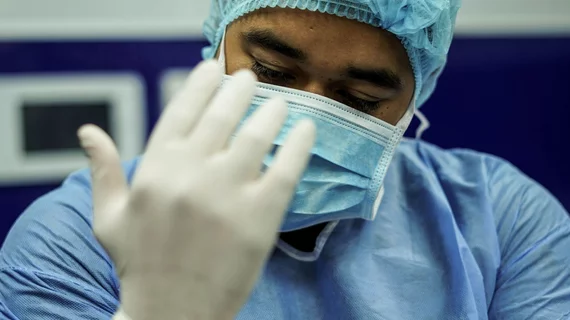Proposed legislation would forgive student loan debt for frontline healthcare workers battling COVID-19
New legislation has been introduced that would forgive student loan debt for frontline healthcare workers who have provided patient care during the ongoing COVID-19 pandemic.
Rep. Carolyn B. Maloney of New York introduced the bill, known as the Student Loan Forgiveness for Frontline Health Workers Act, noting that it would “take care of the people taking care of all of us.” Reps. Steven Cohen, Jahana Hayes, Ilhan Omar, Marc Veasey, Jesús G. “Chuy” Garía, Derek Kilmer, Juan Vargas, Eleanor Holmes Norton and Yvette D. Clarke are all cosponsors of the legislation.
“Frontline health workers are delivering care to the sickest patients and putting their own safety at great risk in order to keep doing their jobs,” Maloney said in a prepared statement. “And in return, I believe that we have an obligation to ensure that they are relieved of the debt they incurred to train for this critical work—in graduate degree programs or other professional certification. Health care workers are worrying about their own health and how it will affect their families. They should not have to worry about their financial security after the crisis has passed.”
Maloney worked with numerous organizations on this legislation, receiving endorsements from the American College of Emergency Physicians, American Medical Association, American Federation of Teachers and Association of American Medical Colleges. Statements from four different medical professionals were included in her announcement.
“Nurses and other health care professionals are our most valuable resource in fighting COVID-19. As these frontline workers heroically provide care at the bedside of critically ill patients, their service should be recognized,” Eileen Sullivan-Marx, PhD, RN, dean of the New York University Rory Meyers College of Nursing and president of the American Academy of Nursing, said in the statement. “Graduate student loan forgiveness would alleviate their financial burdens and acknowledge their sacrifice during this unprecedented time."
“Voting to pass the Student Debt Forgiveness for Frontline Health Care Workers Act into law would be the single most supportive action any lawmaker could take to help frontline healthcare workers like my colleagues and I,” added Manuel Penton III, MD, a pediatric infectious disease doctors at SUNY Downstate Medical Center. “Hazard pay is nice but it pales in comparison to the immense student loan debt accrued by the majority of physicians and nurses in this country who, like myself, come from middle and lower income class backgrounds and who could not afford to become doctors and nurses without taking on this debt. A vote for this bill is a vote for the middle class and any politician would find a plethora of support for a solution to this kitchen table issue affecting families of all political affiliations.”

